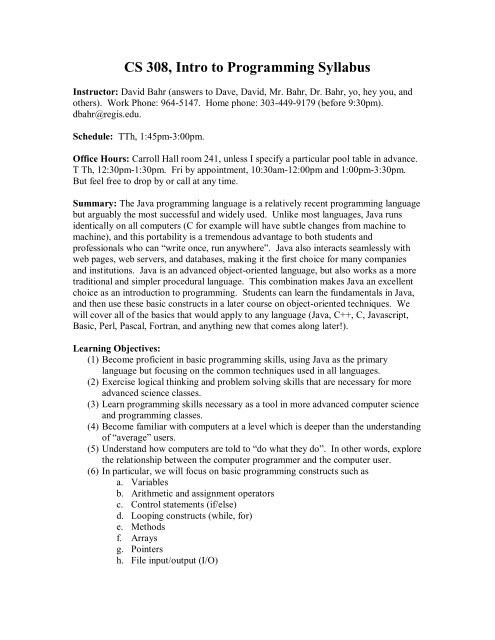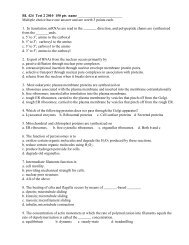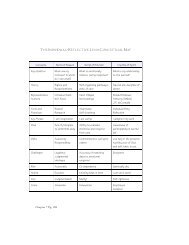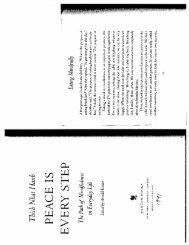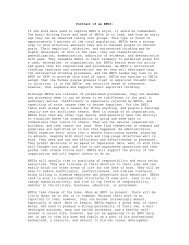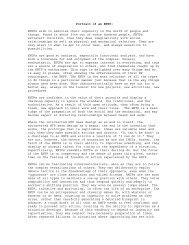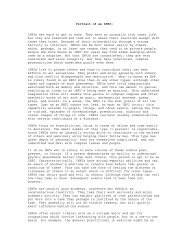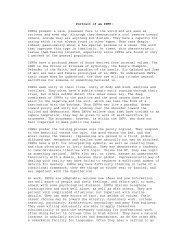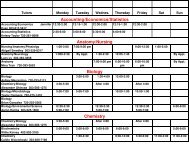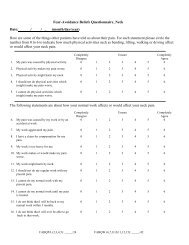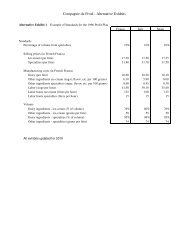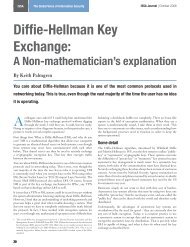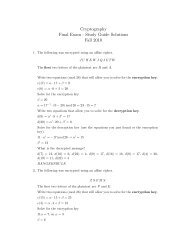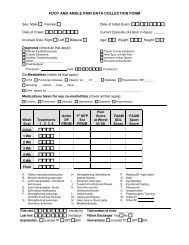CS 320, “C” Programming Syllabus - Regis
CS 320, “C” Programming Syllabus - Regis
CS 320, “C” Programming Syllabus - Regis
You also want an ePaper? Increase the reach of your titles
YUMPU automatically turns print PDFs into web optimized ePapers that Google loves.
<strong>CS</strong> 308, Intro to <strong>Programming</strong> <strong>Syllabus</strong><br />
Instructor: David Bahr (answers to Dave, David, Mr. Bahr, Dr. Bahr, yo, hey you, and<br />
others). Work Phone: 964-5147. Home phone: 303-449-9179 (before 9:30pm).<br />
dbahr@regis.edu.<br />
Schedule: TTh, 1:45pm-3:00pm.<br />
Office Hours: Carroll Hall room 241, unless I specify a particular pool table in advance.<br />
T Th, 12:30pm-1:30pm. Fri by appointment, 10:30am-12:00pm and 1:00pm-3:30pm.<br />
But feel free to drop by or call at any time.<br />
Summary: The Java programming language is a relatively recent programming language<br />
but arguably the most successful and widely used. Unlike most languages, Java runs<br />
identically on all computers (C for example will have subtle changes from machine to<br />
machine), and this portability is a tremendous advantage to both students and<br />
professionals who can “write once, run anywhere”. Java also interacts seamlessly with<br />
web pages, web servers, and databases, making it the first choice for many companies<br />
and institutions. Java is an advanced object-oriented language, but also works as a more<br />
traditional and simpler procedural language. This combination makes Java an excellent<br />
choice as an introduction to programming. Students can learn the fundamentals in Java,<br />
and then use these basic constructs in a later course on object-oriented techniques. We<br />
will cover all of the basics that would apply to any language (Java, C++, C, Javascript,<br />
Basic, Perl, Pascal, Fortran, and anything new that comes along later!).<br />
Learning Objectives:<br />
(1) Become proficient in basic programming skills, using Java as the primary<br />
language but focusing on the common techniques used in all languages.<br />
(2) Exercise logical thinking and problem solving skills that are necessary for more<br />
advanced science classes.<br />
(3) Learn programming skills necessary as a tool in more advanced computer science<br />
and programming classes.<br />
(4) Become familiar with computers at a level which is deeper than the understanding<br />
of “average” users.<br />
(5) Understand how computers are told to “do what they do”. In other words, explore<br />
the relationship between the computer programmer and the computer user.<br />
(6) In particular, we will focus on basic programming constructs such as<br />
a. Variables<br />
b. Arithmetic and assignment operators<br />
c. Control statements (if/else)<br />
d. Looping constructs (while, for)<br />
e. Methods<br />
f. Arrays<br />
g. Pointers<br />
h. File input/output (I/O)
(7) Please note that this is not a graphics class. At the end of the semester we will<br />
touch on graphics and learn some of the basic graphics constructs. You will<br />
become more proficient with graphics in later classes, but first, you will need to<br />
learn the basics outlined above. But don’t worry, the graphics will come<br />
surprisingly fast once you know these basics!<br />
Exams: Mid-term exam, final exam<br />
Homework: Weekly assignments are generally due at the beginning of class one week<br />
after they are assigned. Late homework is not accepted and the grade will be a zero. But<br />
don’t panic! Your lowest homework grade will not be considered in the final grade.<br />
Note: Most assignments will be turned in by email. If your attachment gives me a virus<br />
(causing untold hours of pain, anguish, and despair) then your grade will be a zero. No<br />
one wants to see me in anguish (right?), so invest in a good anti-virus program and keep<br />
it up to date!<br />
Grade: Class participation: 10%<br />
Homework: 30%<br />
Midterm: 20%<br />
Final Exam: 20%<br />
Final Project: 20%<br />
Note that class participation counts for a full letter grade.<br />
Computer Required: Seems obvious, but you absolutely must have your own computer<br />
for this class. No exceptions. See me if this is a problem.<br />
Online Notes: I know you are begging for more, so I’ve posted my lecture notes online<br />
at http://academic.regis.edu/dbahr/. They are great for review, and even better as a class<br />
preview (just imagine how impressed everyone will be with your knowledge of the day’s<br />
topic). The online notes do have some occasional typos and outright errors (after all,<br />
these are nothing more than my “scribbled” notes). I’m going to eventually publish these<br />
notes as a CD, so I’ll grant extra credit to the first person that points out and corrects an<br />
online typo or error. The amount of credit depends on the subtlety and magnitude of the<br />
error. I’ll also credit you on the CD, making your name live forever in “print”.<br />
Topics:<br />
Week 1: Introduction and programming fundamentals<br />
Week 2: Basic programming constructs<br />
Week 3: Basic Java; variables<br />
Week 4: Arithmetic, assignment operators<br />
Week 5: Decision making (if/else), looping (for, while), logical operators<br />
Week 6: Classes and methods<br />
Week 7: Review and midterm (Thursday, March 4; subject to change)<br />
Week 8: More methods<br />
Week 9: Static methods, arrays<br />
Week 10: Arrays and pointers
Week 11: Pointers<br />
Week 12: File I/O<br />
Week 13: More File I/O, intro to graphics<br />
Week 14: GUI Graphics<br />
Week 15: Review<br />
Week 16: Final exam<br />
Special needs: If you have a disability requiring academic adjustments for this class,<br />
please contact Disability Services (303-458-4941). They will help determine appropriate<br />
accommodations. I recommend that you make arrangements as soon as possible because<br />
accommodations cannot be provided retroactively.<br />
Ethics: It hardly needs to be said, but <strong>Regis</strong> takes a very dim view of cheating. Students<br />
who cheat, plagiarize, copy, fake, bootleg, or attempt to con, defraud, swindle,<br />
bamboozle, fleece, dupe, fool, trick, or deceive will fail the course. Other synonyms are<br />
also prohibited. For clarity, copying homework is considered cheating. If you have any<br />
questions about proper conduct please come talk to me.<br />
Consistent with the College's Academic Integrity Policy, I will report all violations to the<br />
Dean's office. Students who have committed multiple instances of academic dishonesty<br />
can be subject to institutional penalties like probation, suspension, or expulsion, in<br />
addition to the penalties for this course. The Academic Integrity policy is described in the<br />
Bulletin; detailed information about the policy and the appeals process can be found in<br />
the Dean's office.<br />
Dr. Bahr’s Grading Policy (in gory detail)<br />
My goal is to produce graduates that I would hire if I was running my own business. I<br />
also want to produce graduate students that I would accept into a PhD program. This<br />
means, of course, that I can’t pass out A’s like free candy. However, it does mean that I<br />
am invested in your progress, and I very much want all of my students to do well.<br />
In the past, I have worked as a manager at various “.coms”. I have also worked with<br />
graduate students on complex research at the cutting edge of science. I know what is<br />
necessary to succeed in the workplace and in graduate school. Therefore, my grading is<br />
not designed to penalize but instead to prepare you with important and necessary skills.<br />
Ideally, this preparation will pay off with the best possible job after graduation and place<br />
you into the best possible graduate school.<br />
To that end, the following might help you to understand my homework assignments and<br />
grading.<br />
(1) My assignments typically have some problems that will reinforce what you have<br />
learned in the classroom and in any assigned reading. Each assignment will also<br />
have one or more problems designed to “push your envelope” and to see if you
can stretch your newfound knowledge into a situation that was not covered<br />
explicitly in the classroom.<br />
(2) In some classes, the assignments are “cumulative” with a build-up to the final<br />
project. Initial assignments develop skills that are used later in the semester.<br />
(3) Students that do the assigned reading almost always get a better grade. The<br />
required reading, if any, is at the top of each assignment.<br />
(4) I always drop your lowest homework score for the semester. In other words, you<br />
get one “freebie”. Why? Because everyone has a bad hair day. You might get<br />
the flu, you might have a family emergency, or you might just have trouble with<br />
the assignment. I remove that lowest score, no questions asked. But please,<br />
consider saving that freebie for a rainy day. Don’t blow off an assignment early<br />
in the semester, or you might not have the freebie later in the semester when you<br />
really need it. That’s a rookie mistake.<br />
(5) I don’t accept late homework. All assignments are due at the beginning of the<br />
class hour. That includes any written, emailed, and/or oral portions of the<br />
assignment. It is not acceptable to print or email your work an hour after class.<br />
This policy is uniform and fair to all concerned.<br />
By the way, I am MOST interested in having you learn the material, so if your<br />
assignment is late, you may still turn it in. I will grade the late work, but I won’t<br />
give you credit. Remember, if your job assignment is late, then they just fire you.<br />
In that light, my policy seems downright lenient. <br />
(6) I do not grade on a curve. In some semesters, I have had every student in my<br />
class get an A for the semester. Awesome! However, I am not afraid to pass out<br />
low grades, and I occasionally have to fail a student. I hate doing that, and if you<br />
are struggling please seek my assistance early. I have never had to fail anybody<br />
that sought help on a regular basis.<br />
(7) I do not tolerate cheating or copying. It’s an automatic fail for the class. You<br />
may always work together on assignments, but I recommend sitting face to face<br />
so that you cannot actually copy your partner’s work. (By the way, it is a<br />
common misconception that your code will be identical to everybody else’s.<br />
Everyone has different code, even for the simplest assignments.)<br />
(8) 10% of your final grade at the end of the semester is for “participation”. This is<br />
not an attendance score. Instead, I’m looking for interaction, interest, questions,<br />
and positive contributions inside the classroom. If you are contributing and<br />
asking questions regularly, I almost always give the full 10%.<br />
(9) Please note that I do not give credit for “effort” on individual assignments – some<br />
folks just have to put in more time than others. That’s neither a positive nor
negative assessment of your skills, so homeworks are graded strictly on merit.<br />
But any extra effort will certainly count towards the 10% participation grade!<br />
(10) I am neither the easiest nor the toughest grader on campus, but I am<br />
reasonable and open to questions. If you are ever puzzled by your grade, you<br />
should feel free to ask. On some occasions, I will give back points if you can<br />
explain your motivation.<br />
(11) I can be very particular about the details. This is not because I hate you, I<br />
promise. Instead, I’m trying to encourage good habits that will make you a star<br />
on the job. So I will frequently take off a small number of points for poor<br />
spelling, poor grammar, poor formatting, poor commenting, poor exception<br />
handling, etc. With atrocious grammar, would you expect to keep a job as a<br />
journalist? No. Similarly, you can’t expect to keep a job as a programmer with<br />
atrocious formatting, commenting, etc. So, after four years of careful critique,<br />
most of my students do an excellent job at “getting the details right”.<br />
(12) Finally, I return assignments promptly. If you have not received your<br />
graded assignment after one week, that would be very odd. So come to see me<br />
and make sure that (1) my dog didn’t eat your assignment, and (2) the world<br />
hasn’t ended.<br />
For your effort on the assignments, I promise that you will have a better understanding of<br />
the material, and that this will translate to confidence on the job. Talk to some of my<br />
graduates, and they will tell you that the homework really pays off! My students have<br />
been very successful in the workplace, and some employers call me each year to ask<br />
specifically for my graduating seniors.


